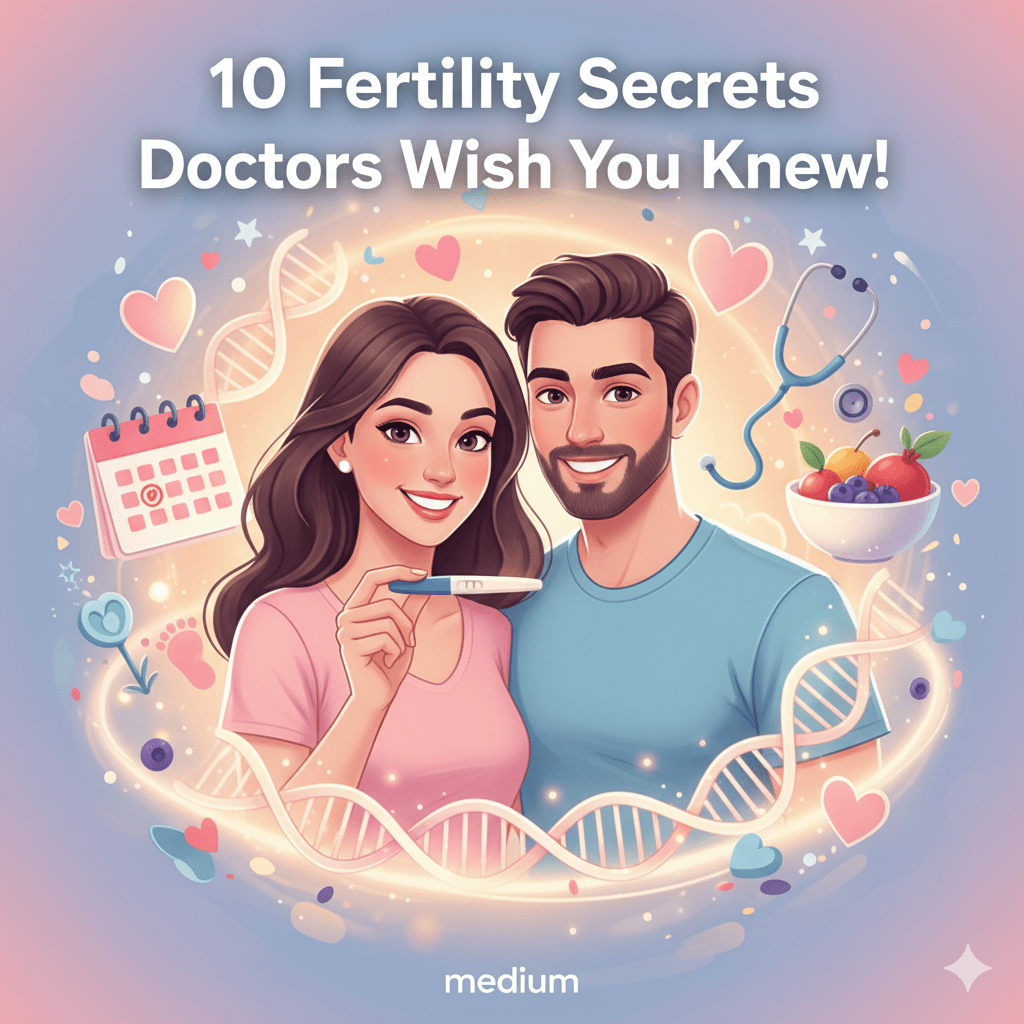10 Fertility Secrets Doctors Wish You Knew Before Trying to Conceive

Bringing a new life into the world is one of the most profound experiences a couple can share. Yet, for many people, conceiving isn’t always as straightforward as they expect. While information about fertility is widely available, some of the most crucial insights remain under-discussed outside a doctor’s office. Whether you are just starting to plan for a baby or have been trying for a while, understanding key fertility factors can make the journey smoother, more informed, and less stressful. Here are ten fertility secrets doctors wish you knew before trying to conceive.
1. Your Fertility Window Is Shorter Than You Think
Many people assume that conception can happen at any time in the menstrual cycle, but the fertile window is surprisingly narrow. You are most fertile during the five days leading up to ovulation and the day of ovulation itself. Tracking ovulation through basal body temperature, cervical mucus changes, or ovulation predictor kits can significantly increase your chances of conception.
2. Age Plays a Bigger Role Than Most Expect
It’s no secret that age impacts fertility, but many couples underestimate how quickly fertility can decline. Women are born with a finite number of eggs, and their quantity and quality decrease more rapidly after age 35. Men also experience a gradual decline in sperm quality after 40. Understanding these biological timelines can help you plan better and avoid unnecessary delays.
3. Sperm Health Matters Just as Much as Egg Health
Conception isn’t solely about female fertility. Male factors contribute to about 40% of infertility cases. Sperm count, motility (movement), and morphology (shape) all affect the chances of pregnancy. Lifestyle habits such as smoking, excessive drinking, poor diet, and high stress can harm sperm quality. Men should prioritize healthy choices just as much as women when planning for a baby.
4. Weight and Nutrition Affect Fertility More Than You Realize
Maintaining a healthy weight is crucial for both men and women. Being underweight can disrupt ovulation, while being overweight can lead to hormonal imbalances that make conception more difficult. A nutrient-rich diet packed with whole grains, lean proteins, healthy fats, fruits, and vegetables supports reproductive health. Nutrients like folate, zinc, and vitamin D play a particularly important role in egg and sperm quality.
5. Stress Can Interfere with Conception
While stress alone doesn’t cause infertility, chronic stress can disrupt the hormonal balance necessary for ovulation and healthy sperm production. High cortisol levels can delay or prevent ovulation in women and reduce sperm quality in men. Incorporating stress-reducing activities such as yoga, meditation, regular exercise, or even simple deep-breathing techniques can create a healthier environment for conception.
6. Timing Matters More Than Frequency
Many couples believe that having intercourse daily is the best way to conceive, but timing is far more important than frequency. Intercourse every other day during the fertile window is ideal for ensuring a steady supply of healthy sperm. Too much frequency can reduce sperm quality, while too little can mean missing the ovulation period.
7. Medical Conditions Can Be Silent Fertility Blockers
Certain medical conditions can quietly affect fertility without obvious symptoms. Polycystic ovary syndrome (PCOS), endometriosis, thyroid disorders, and blocked fallopian tubes are common issues that may go unnoticed until you try to conceive. For men, issues like varicoceles (enlarged veins in the scrotum) or hormonal imbalances can reduce fertility. Regular check-ups and early testing can detect and address these conditions before they become obstacles.
8. Lifestyle Choices Impact Both Partners
Smoking, excessive alcohol consumption, recreational drug use, and exposure to environmental toxins all harm fertility. Cigarettes damage egg quality and sperm DNA, while alcohol can disrupt hormonal balance. Reducing or eliminating these habits months before trying to conceive significantly improves the chances of a healthy pregnancy.
9. Supplements Can Provide a Boost But Only with Guidance
Prenatal vitamins aren’t just for pregnancy; taking them before conception helps prepare the body. Folic acid reduces the risk of birth defects and supports healthy cell division. Coenzyme Q10 and omega-3 fatty acids are known to improve egg and sperm quality. However, it’s essential to consult a doctor before starting any supplements to ensure proper dosage and avoid harmful interactions.
10. Professional Help Is Available Sooner Than You Think
Many couples wait too long before seeking medical help, believing they just need more time. Doctors generally recommend seeing a fertility specialist if you’ve been trying for a year without success (or six months if you’re over 35). Early consultation can identify underlying issues, provide tailored treatment options, and increase your chances of a healthy pregnancy.
Schedule Beta-hCG at Dr. Essa Lab
Preparing for the Journey Ahead
Trying to conceive is a deeply personal and emotional experience. Understanding these fertility secrets empowers you to make informed decisions and avoid unnecessary anxiety. From tracking ovulation and maintaining a healthy lifestyle to addressing silent medical conditions, small changes can make a big difference in your ability to conceive.
If you’re planning to start a family, don’t hesitate to schedule a preconception check-up with your doctor. A few proactive steps, such as assessing hormone levels, reviewing medications, and discussing any concerns, can provide clarity and confidence. Fertility is a shared responsibility, and with the right knowledge and preparation, you and your partner can take meaningful steps toward welcoming a new life into the world.
By embracing these insights before you begin trying, you can navigate the path to parenthood with greater understanding, less stress, and a higher likelihood of success.
- Vibnix Blog
- Politics
- News
- Liberia News
- Entertainment
- Technology
- Education
- Art
- Causes
- Crafts
- Dance
- Drinks
- Film
- Fitness
- Food
- Games
- Gardening
- Health
- Home
- Literature
- Music
- Networking
- Other
- Party
- Religion
- Shopping
- Sports
- Theater
- Wellness



